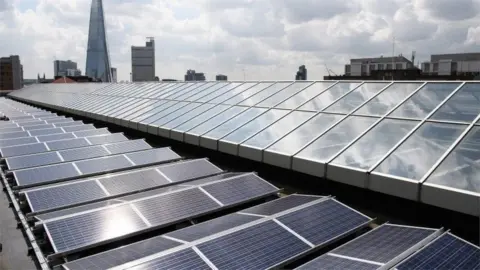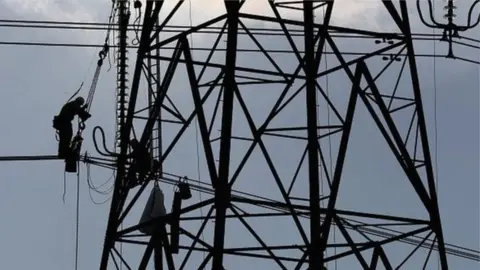How a 'smarter' power system might affect you
 Getty Images
Getty ImagesMajor changes to the way electricity is produced, used and stored are being planned by the government.
It hopes we will be able to create power in our own homes, store it and even sell it back to the National Grid.
This could mean billions of pounds in savings for UK households, the Business Secretary, Greg Clark, has said.
How will it work? And how soon can we all tap into this power revolution?
Here are a selection of questions asked by readers of BBC online.
What is happening?
The Smart Systems and Flexibility plan is designed to reduce energy bills by making the electricity network more efficient, and allow homes and businesses to manage their electric use more effectively.
Currently, the price of electricity varies throughout the day, depending on levels of supply and demand, but most consumers are on flat rate tariffs that do not reflect the times of day when power is cheaper.
The government says it aims to:
- Ensure all household and businesses are offered a smart meter by the end of 2020, which should give consumers greater control, and record when in the day energy is used.
- Change the way energy suppliers account for the energy they buy. In future, energy suppliers will be able to make smart tariffs more widely available to consumers. For example, there might be more periods of off-peak electricity.
- Set standards for appliances (such as white goods, or in future electric vehicles) that are able to automatically respond to price signals and use electricity when it is cheapest.
 Getty Images
Getty ImagesI am one of those with solar panels - what does this mean for me?
The government says the 700,0000 houses that have solar panels will benefit as the new plan opens up the possibility of households storing their power on batteries.
Some companies already offer consumers a battery package, which means they can store to excess power and either use it when they get home from work, or export it to the grid.
However, those planning to install solar power will not be given new support for installing solar panels now. But the existing Feed-in Tariff remains in place.
What rate of return might I expect for an investment in solar panels?
It may not be possible to calculate this without knowing how much power you would be able to buy and sell.
Rates of return are dependent on factors such as light levels, technology used and location.
The current support for just domestic solar panels can result in a 6-10% return, but this excludes battery storage devices, which are more expensive.
Where do the batteries come in?
Storage is expected to operate at different scales across the energy system.
The government says some might be existing technologies like pumped hydro (pumping large volumes of water up a hill into manmade reservoirs, and releasing it when electricity is needed), or in big batteries housed in warehouses.
Household battery use could also increase, possibly using the battery in an electric vehicle or a battery on the wall.
Are batteries going to get cheaper?
At the moment they are expensive, but the price is expected to fall with increased innovation and greater production.
The batteries used in homes are usually the same as those that are used in electric vehicles (lithium ion).
As more of these are built and bought the costs of batteries is expected to fall rapidly.
A recent Renewable Energy Association/KPMG report put the expected cost reduction at 30% over the next three years.
Used car batteries are also now being used in homes. Nissan has a partnership with Eaton Energy Storage to install their English-made used electric vehicle batteries in homes, once they are no longer responsive enough to be used on the road, but can still provide effective home storage.
Will connecting household appliances to the internet make homes more vulnerable to hacking?
The government has been looking at this and says it recently commissioned work on the seriousness of the cyber security risk up to 2030.
It says it is using this to assess the cyber security risks contained in a smart energy system.
The government also proposes to take on additional powers for smart appliances as part of this programme, although it is not yet clear what these would be.
